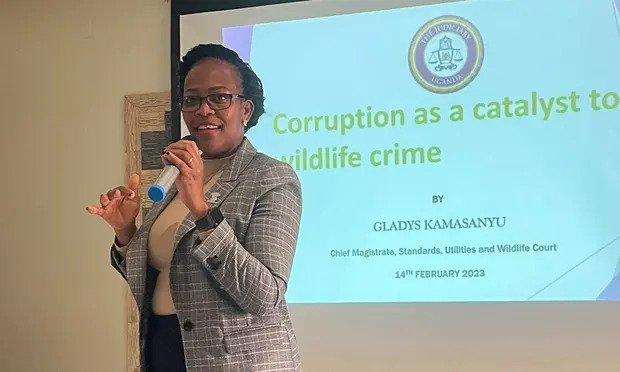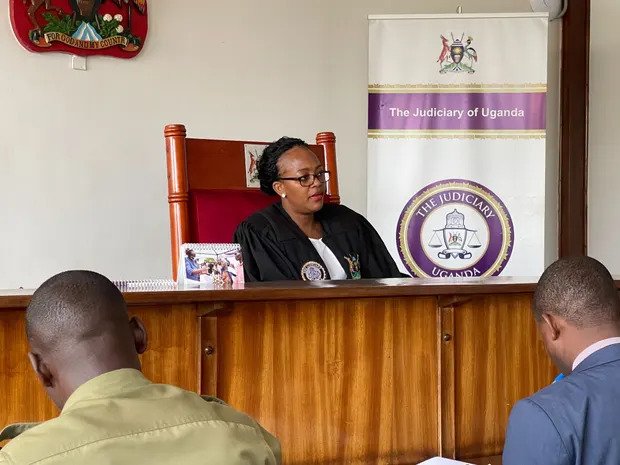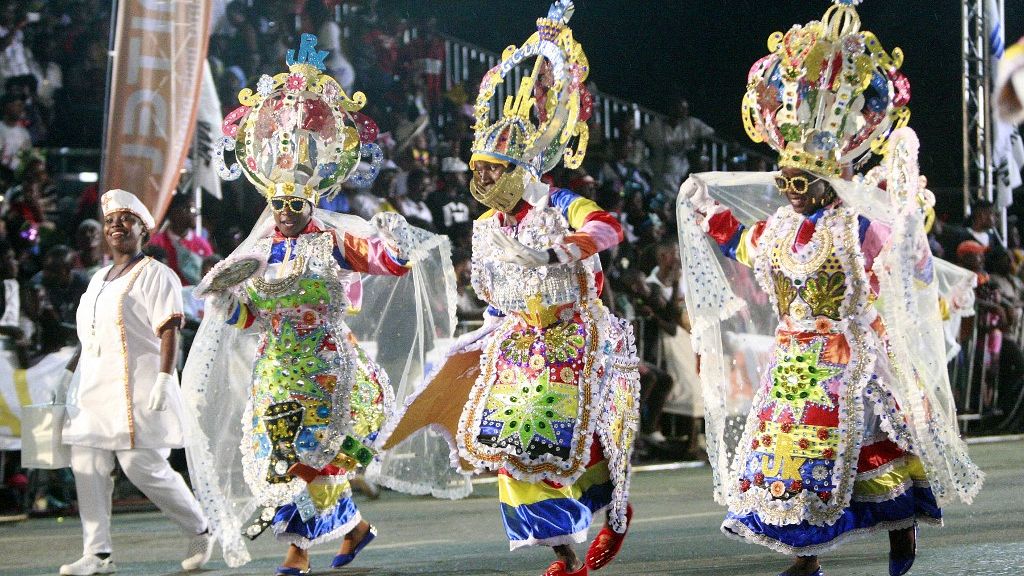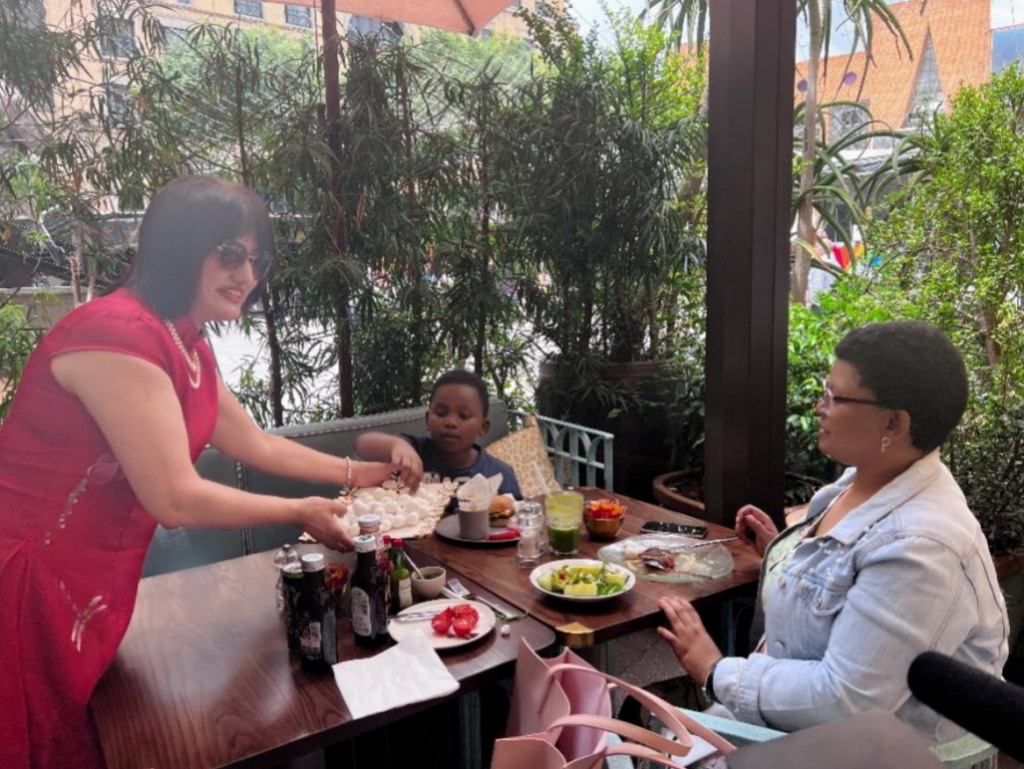Having tried more than 1,000 wildlife crime cases, Gladys Kamasanyu is changing attitudes to animal rights and the ‘cruel’ trade in rhino horns, pangolins and ivory

hen Gladys Kamasanyu was asked to become head of a new wildlife court in Uganda in 2017, she felt conflicted. Although the chief magistrate had participated in discussions that led to the court’s creation – the first in Africa dedicated to wildlife crime – part of her wanted to stay with the human cases she had always adjudicated on rather than swap the familiar for the risk of the unknown.
Kamasanyu has tried more than 1,000 wildlife cases, convicting more than 600 traffickers, including a man sentenced to life in prison last year for possession of ivory. She has presided over cases involving pangolins, the most trafficked mammal in the world, and ruled on cases involving rhino horns, elephant ivory and hippopotamuses’ teeth.
“Kamasanyu has lifted the bar for wildlife adjudication in Uganda, if not the region,” says Edward Anyoli, a court reporter in Kampala. “She’s in court Monday to Friday, hearing cases and evidence or writing judgments. Her court might be the only one in the country without a backlog.”
Two years ago, on UN Wildlife Day, the Ugandan Ministry of Tourism, Wildlife and Antiquities presented Kamasanyu with an award for her contribution to Ugandan conservation.
“Kamasanyu gives rulings on sophisticated wildlife criminals,” says Barirega Akankwasah, director of Uganda’s environmental agency. “She isn’t afraid to sentence them, even when it puts her in danger.”
Her example has sent a strong message to poachers. For years, criminals used Uganda as a conduit for trafficking wildlife products from the Democratic Republic of the Congo and South Sudan. Now they think twice before they commit wildlife crime here, says Akankwasah.
“[Before we started] the justice system prioritised other cases,” says Kamasanyu. “But our animals were dying, some of our species were going extinct. I’m playing my part to reverse this.”
Her stern rulings have led some to suggest that the chief magistrate prefers animals to humans. She denies that: “I love animals just the way I love life and humanity.”
Born in south-west Uganda, Kamasanyu grew up around animals – she is the proud owner of a nine-year-old chicken called Kisakye (“her mercy”) – but she never imagined wildlife would feature in her career plans.
In 2021, she threw herself into learning about wildlife, biodiversity and the environment, studying animal law at the Lewis & Clark law school in the US city of Portland. But it was not until she presided over cases, hearing graphic testimonies of how poachers killed animals, that she decided to commit herself to fight for wildlife “as long as I shall live”.

“You can’t imagine the cruelty poachers subject these animals to,” says Kamasanyu. “They trap them, shoot them, poison them; they chase them all day.”
Kamasanyu says all her cases are special but some are unique, including the poacher she sentenced to life imprisonment. “He was a repeat offender. He had been tried, convicted and sentenced to 18 months in prison in 2017. What does he do when he gets out? He’s arrested again with the same ivory and okapi skin in the same area.
“I speak for the animals. I speak for those non-humans who cannot speak. If I don’t speak loudly, I’m not doing a good job.”
Kamasanyu founded Help African Animals, an organisation that trains prosecutors and investigators of wildlife crime and animal rights. “There is a lot of ignorance in our society,” she says.
“Many people think animals are [their] property and that they can go to forests and hunt them every day. They think these animals give birth every day and that they will always be there.”

The magistrate regrets that by the time poachers are caught, it is too late for the animal. “I’m frustrated whenever the prosecution fumbles a case and I have to dismiss it,” she says.
She is also unhappy that law enforcement agencies continue to miss the big players behind wildlife crime. “We are arresting the smaller players down the line who poach because they have been promised 5,000 shillings [£1] for every animal. But we miss the kingpins who send them.” She points to a 2019 case involving a Vietnamese gang arrested with almost four tonnes of ivory and pangolin scales, who fled the country after securing bail.
Despite this, Kamasanyu hopes she can make a difference: “People have to understand that animals aren’t property, and that they won’t always be here if we don’t protect them.”
Burna Boy to perform at UEFA Champions League final in Istanbul

Paul R. Giunta/2022 Invision
GRAMMY Award-winning and multi-platinum-selling singer, songwriter, and producer, Burna Boy, will co-headline the highly anticipated 2023 UEFA Champions League Final Kick-Off Show in Istanbul, Turkey.
The global chart-topping ‘Last Last’ and ‘It’s Plenty’ megastar will bring his signature soulful vibes of afrobeat’s to Istanbul’s Atatürk Olympic Stadium on June 10.
Fans from across the globe tune in to watch the must-see performance only moments before the biggest game in club football gets underway.
The news was announced on the Twitter page of the UEFA Champions League, accompanied by a video from Burna Boy.
“Hello everyone, this is Burna Boy and I’ve got some big news,” the Grammy Award winner said in the video.
“I’ll be performing at the UEFA Champions League final kick-off show by Pepsi. Come on, let’s go!”
The Champions League is currently in the quarter-final stage, with eight teams set to compete for the right to be called European champions.
These are AC Milan, Inter Milan, Napoli, Manchester City, Chelsea, Bayern Munich, Benfica, and defending champions Real Madrid.
Meanwhile, Burna Boy recently delivered an impressive performance during the 2023 NBA All-Star halftime show in February.
He, together with fellow Nigerian singers Tems and Rema, thrilled the audience with their hit tracks, further selling African music to the world and basketball fans.
Team Lebron lost 175-184 to Team Giannis during the entertaining encounter that featured a number of African players, with the night capped off by great African music.
Scientists discover hidden corridor in Egyptian pyramid
By Rédaction Africanews and Afp
Scientists have discovered a hidden passage inside Egypt’s Great Pyramid, the authorities announced on Thursday, part of a seven-year international research project.
The passage is nine metres (30 feet) in length and more than two metres in width, the antiquities ministry said in a statement.
Egypt’s Tourism and Antiquities Minister Ahmed Issa told reporters at the ancient site in Giza also known as the Khufu, or Cheops, pyramid, that the “gabled corridor” with a triangular ceiling “was found on the northern face of the Great Pyramid of King Khufu”.
The discovery was part of the ScanPyramids project, launched in 2015 as a collaboration between major universities in France, Germany, Canada and Japan and a group of Egyptian experts.
Archaeologist Zahi Hawass, Egypt’s former antiquities minister, heads the committee supervising the project, which uses advanced technology to visualise hidden parts of the pyramid’s interior without having to excavate it.
The technology is a mix of infrared thermography, muon radiography imaging and 3D reconstruction — all of which the researchers say are non-invasive and non-destructive techniques.
The Great Pyramid is the largest in Giza, standing 146 metres tall, and the only surviving structure of the seven wonders of the ancient world.
Built some 4,500 years ago, it has three known chambers, and like other pyramids in Egypt was intended as a pharaoh’s tomb.
Hawass told reporters at the pyramid on Thursday that “there is a great possibility… the tunnel is protecting something. In my opinion, it is protecting the actual burial chamber of King Khufu.”
In 2017, ScanPyramids announced the discovery of a passenger plane-sized cavity, the first major structure found inside the Great Pyramid since the 19th century.
Symbol of resilience: Africa’s premiere film fest returns to Burkina Faso’s capital

Sophie Garcia/Copyright 2023 The AP. All rights reserved
By Rédaction Africanews and AP
**The weeklong FESPACO that opens Saturday (Feb. 25) in Burkina Faso’s capital goes beyond entertainment and seeks to also offer hope, and a symbol of endurance: In years of political strife and Islamic extremist attacks, which killed thousands and displaced nearly 2 million in the West African country, it’s never been cancelled.
**
“We only have FESPACO left to prevent us from thinking about what’s going on,” said Maimouna Ndiaye, a Burkinabe actress who has four submissions in this year’s competition. “This is the event that must not be canceled no matter the situation.”
Since the last edition of the biennial festival in Ouagadougou, the country’s troubles have increased. Successive governments’ failures to stop the extremist violence triggered two military coups last year, with each junta leader promising security.
At least 70 soldiers were killed in two attacks earlier this month in Burkina Faso’s Sahel region. The fighting also has sowed discord among a once-peaceful population, pitting communities and ethnicities against each other.
100 films selected
Nevertheless, more than 15,000 people, including cinema celebrities from Nigeria, Senegal and Ivory Coast are expected in Ouagadougou for FESPACO, Africa’s biggest film festival that was launched in 1969.
Some 1,300 films were submitted for consideration and 100 have been selected to compete from 35 African countries and the diaspora, including movies from Dominican Republic and Haiti. Nearly half of those in the fiction competition this year are directed by women.
Among them is Burkinabe director and producer Apolline Traore, whose film “Sira” — considered a front-runner in this year’s competition — is emblematic of many Burkinabes’ suffering. It tells the tale of a woman’s struggle for survival after being kidnapped by jihadis in the Sahel, as her fiancé tries to find her.
Still, Traore is upbeat about her country’s prospects.
“The world has painted Burkina Faso as a red country. It’s dangerous to come to my country, as they say,” she told The Associated Press. “We’re probably a little crumbled but we’re not down.”
Government officials say they have ramped up security and will ensure the safety of festival attendees.
Many hope FESPACO will help boost domestic unity and strengthen ties with other countries.
Wolfram Vetter, the European Union ambassador in Burkina Faso, called the film festival “an important contribution to peace and reconciliation in Burkina Faso and beyond.”
The EU is the event’s largest funder after the Burkinabe government, and has contributed approximately 250,000 euros ($265,000).
Carnival returns to the streets of Bissau after a two-year absence
XAUME OLLEROS/AFP or licensors
By Africanews
After an interruption that lasted two years due to the pandemic, Carnival returned to the streets of Bissau last Saturday bringing together all ethnic groups in a show of colour and unity.
“The Guinea Bissau carnival is authentic and original, because it shows the customs of each ethnic group in the country and its cultural diversity: its dynamics, its way of singing, dressing and dancing. It is truly an authentic and original carnival!”, said Rui Manuel Da Costa, co-organiser of the Carnival.
For many, Carnival represents an opportunity to celebrate the country’s diverse cultural heritage.
This year, neighbouring Senegal was the guest of honour.
“Carnival means a lot to me, because it allows me to feel truly Guinean.
It is with the carnival that we can represent our culture and our way of life. I would like every Guinean to be able to show and live his or her culture, because every day our cultural heritage is disappearing”, said Carnival participant Alfredo Sylvestre Nanque.
Another Carnival participant, Daniela Semedo Djoco, “the elders are trying to save our cultural heritage, but the youth don’t want to learn.
The government must set up a mechanism to make young people aware of Guinean culture, because our culture is very beautiful”.
The event was opened by the minister of Culture, Youth and Sport, Augusto Gomes, who stressed the close ties shared with neighbouring Senegal.
Angolans flood the streets for Luanda Carnival’s post-pandemic return

AMPE ROGERIO/AFP or licensors
By Afolake Oyinloye and AFP
“We came as a family” says Manuel Dos Santos Macaia, “I’m here with the children to show them the importance of the carnival”. “The carnival, for me, is a thing of joy” explains Joaquina Menez Andre, a dancer, “now that we’ve come back to dance, it makes us feel good.”
Luanda has its own Sambadrome and a massive parade that will be attended by the eminent personalities. Carnaval stands up to its name as the greatest festival in Angola with its colorful celebration, libations, national holiday, and Brazilian-style event.
Paulino Rocha, has been commander of the group ‘Kilamba Un-ion’ for 7 years:
“We’re here to do exactly what’s best to do, that is to say, to dance the carni-val and show how the União de Recreativo de Kilamba group has come with innovation to tell the truth. We do not run away from our cultural identity, because of this our repetition (ed: motto) will be “Angola traditions and memories”.”
“Now in 2023, we are here with a lot of strength, a lot of determination, giv-ing the maximum, and I ask that those responsible take into account those who work and, above all, respect the work we do, because it is a bit too much work if (ed: we can) not come to dance – here!”
Joaquina Menez André, could not hide her excitement for the biggest celebration of the year.
“The carnival for me is a joy, after two years without dancing, frankly I was always sad, but now that we’ve come back to dance, it makes us feel good, a joy rediscovered, the carnival, a really good party.”
The three-day festival is scheduled a few days before to Ash Wednesday. Tuesday is the largest day since it hosts the biggest and liveliest procession.
Promotional video for the 2023 CMG Lantern Festival Gala screened for the first time in Mandela Square
By CGTN Africa
The promotional video for 2023 CMG Lantern Festival Gala was screened for the first time on Friday at the Nelson Mandela Square in Johannesburg, South Africa’s largest city.

Local residents and visitors are served with sweet dumplings for this traditional Chinese festival.

South African police launch manhunt after poachers kill two rhinos
By Jerry Omondi
February 5, 2023

South African police have launched a manhunt for poachers who shot two rhinos dead and dehorned them on Wednesday evening.
The poachers sneaked into a safari farm in the Paterson area in the Eastern Cape where the animals were harbored.
“It is alleged that the two adult rhinos (male and female) were last spotted during an afternoon game drive on the 1st of February and were discovered dead the following afternoon. Both horns from both carcasses were hacked off. A case of illegal hunting of a protected animal without a permit is under investigation,” SABC quotes Police spokesperson Priscilla Naidu to say.
The killing of the rhinos is a setback to the country’s efforts to eliminate poaching and restore the number of endangered animals.
Despite strict laws and heavy punishments prescribed for poachers, rhino killings are still reported frequently in the country, attributed to a ready and lucrative black market.
In 2021, a total of 451 rhinos were poached in South Africa, with 2019 recording a much higher number of 594 killings.
To boost its efforts to combat wildlife trafficking, South Africa widened its international partnerships to transit and end user countries in Southeast Asia.
The Directorate for Priority Crime Investigation said last year the partnerships had seen an increase in arrests made against rhino smugglers.
Egypt hosts new edition of Arab world’s largest book fair amid economic crisis
KHALED DESOUKI/AFP or licensors
By Rédaction Africanews and AFP
The 54th annual Cairo International Book Fair is taking place against the backdrop of a deep economic crisis.
Egypt’s currency, the pound, halved in value and prices skyrocket in the past year with inflation hitting 21.9 percent in December
“The situation in Egypt, the rising dollar exchange rate and the import crisis, have led to a major increase in the publishing cost, including the papers, the inks, etc, since all the materials are imported. So, books are now quite expensive for everyone. In addition, they’re considered as an entertainment product.”
Egypt’s publishing industry — historically a key exporter of Arabic literature — has already shown signs of trouble.
As the pound plummeted, the price of basic paper stock quadrupled, forcing publishers to “decrease commissions and print fewer books per edition”, Wael al-Mulla, CEO of publishing house Masr El Arabia said.
“We lost the advantage of low (book) prices compared to other Arab countries. Books prices (in Egypt) were low compared to Arab countries and foreign markets, so there was a high demand for Egyptian books. Today, after we’ve been forced to increase our prices due to the inflation, we are nearing their price level,” he explained.
Incentivise book lovers
Organisers say the Arab world’s largest book fair lured more than half a million visitors on its opening weekend — but with publishing houses already struggling to cover the rising cost of printing, many fear this won’t translate to sales.
To incentivise readers, Egypt’s publishers association have encouraged sellers to give readers the option of buying books in instalments through popular buy-now-pay-later services. Publishing houses also banked on different strategies.
“Many of the exhibiting publishers offer discounts. For example, if you buy five or ten books, you get big discounts. Of course, not many can afford buying ten books, so usually friends decide to buy books from the same place, to get them discounted,” a volunteer and engineering student revealed.
If the price of new books increased by up to double, in a corner of the fair, vendors from Cairo’s iconic Azbakeya second-hand book market appear unphased by the economic downturn.
With most volumes going for under 20 pounds or about less than one dollar, buying used books or pirated prints from Azbakeya has become a necessity for some.
They will run through February 6.
Volume 90%
Kew looks to native wildlife of Cameroon for 2023 Orchid Festival
Alastair Grant/Copyright 2019 The AP. All rights reserved
By Africanews with AP
An apex predator, created in vibrant florals.
Florists and gardeners are putting the finishing touches to this lion installation at the Royal Botanic Gardens, Kew.
The huge sculpture is the centrepiece of Kew annual orchid festival.
Planning for the event began last summer.
For the last three weeks, five Kew gardeners and an army of almost 1,000 volunteers have been setting up the vivid displays.
Thousands of orchids shipped in from the Netherlands have been used to decorate the Princess of Wales Conservatory.
“We have 6,200 plants that got brought for the orchid festival. Within those, 3,200 are orchids and you have mainly phalaenopsis orchids and cymbidiums. Those orchids have been bred for many years and we have a varied choice of colours and shapes for our design,” says Solene Dequiret, supervisor of the Princess of Wales Conservatory, Royal Botanic Gardens, Kew.
This year, the theme of the festival is Cameroon.
It’s the first time an African nation has provided the inspiration for this event.
The country’s influence can be seen in animal sculptures dotted around the conservatory – a wallowing hippo, a crocodile ready to snap, or a giraffe with its head in the clouds.
But the Cameroonian flavour goes deeper than these animals.
“So we took inspiration from the native fauna and flora of Cameroon, but also from their huge diversity, melting pot of communities. There is over 250 different communities in Cameroon and chefferies (chiefdoms). And they have amazing artwork, beaded artwork. So we took this inspiration of the bead for our necklace of orchids. And also they’ve got fabric and all those colours. We took that as an inspiration for the palette of colour we used,” says Dequiret.
A photography exhibition sits alongside the flowers.
These photographs are by Yvon Ngassam and capture life in the village of Bikoka, Lolodorf in Cameroon.
They are part of the Bikoka Art Project, an art initiative for women and young people from the country.
The exhibition has been curated by art critic and historian Christine Eyene.
“The series was taken in Bikoka, which is a really small village, but it’s in the forest region. So the region where the photographs have been taken is actually similar to the region where Kew scientists have been doing their research. So there are also a lot of landscapes in the photographs and some of them blend with the nature that is found here at the Princess of Wales Conservatory,” she says.
Wandering through the greenhouse, if you listen carefully, you might hear the sounds of music and other noises.
For Eyene, the whole experience is about putting an African stamp on Kew’s orchid festival.
”Really it’s about in a way the Black presence at Kew Gardens and in this conservatory. There’s also a soundscape that goes with the exhibition. So it’s about the sound from our culture and we want people to sort of be immersed in the sonic environment that they would get if they were going to Cameroon,” says Eyene.
Kew’s orchid collection holds about 1,300 species – a fraction of the 25,000 that have been discovered around the world.
Wild orchids are under threat.
Professor Michael Fay, an orchid expert and Senior Research Leader at Kew, says Cameroon’s orchids are doing no better.
“Cameroon has about just over 400 species of wild orchids. And we know where we are with about 25% of those. And they have about the same level of threats as orchids worldwide, so that somewhere between 60 and 70% of them are threatened with extinction in the wild,” he says.
Orchids can be an early indicator of an eco-system in trouble.
They are dependent on fungi which provide them with food, as well as a variety of pollinators.
So when orchids start to die off, it’s a sign that another part of that complex chain which supports them could also be in danger.
In Cameroon, orchids face a very particular set of threats.
“Orchids in general are more threatened than plants on average. And depending on the part of the world we’re talking about, then the threats can be different. So many orchids in Asia, for example, are collected for traditional medicines. In southern Africa, many of them are collected for food,” says Fay.
“But in places like Cameroon, the threats are rather different. And that’s largely due to conversion of land for agriculture, destruction of forests. And increasingly we’re worried about climate change, of course.”
This is the 27th orchid festival at Kew.
It runs from 4 February until 5 March 2023.

